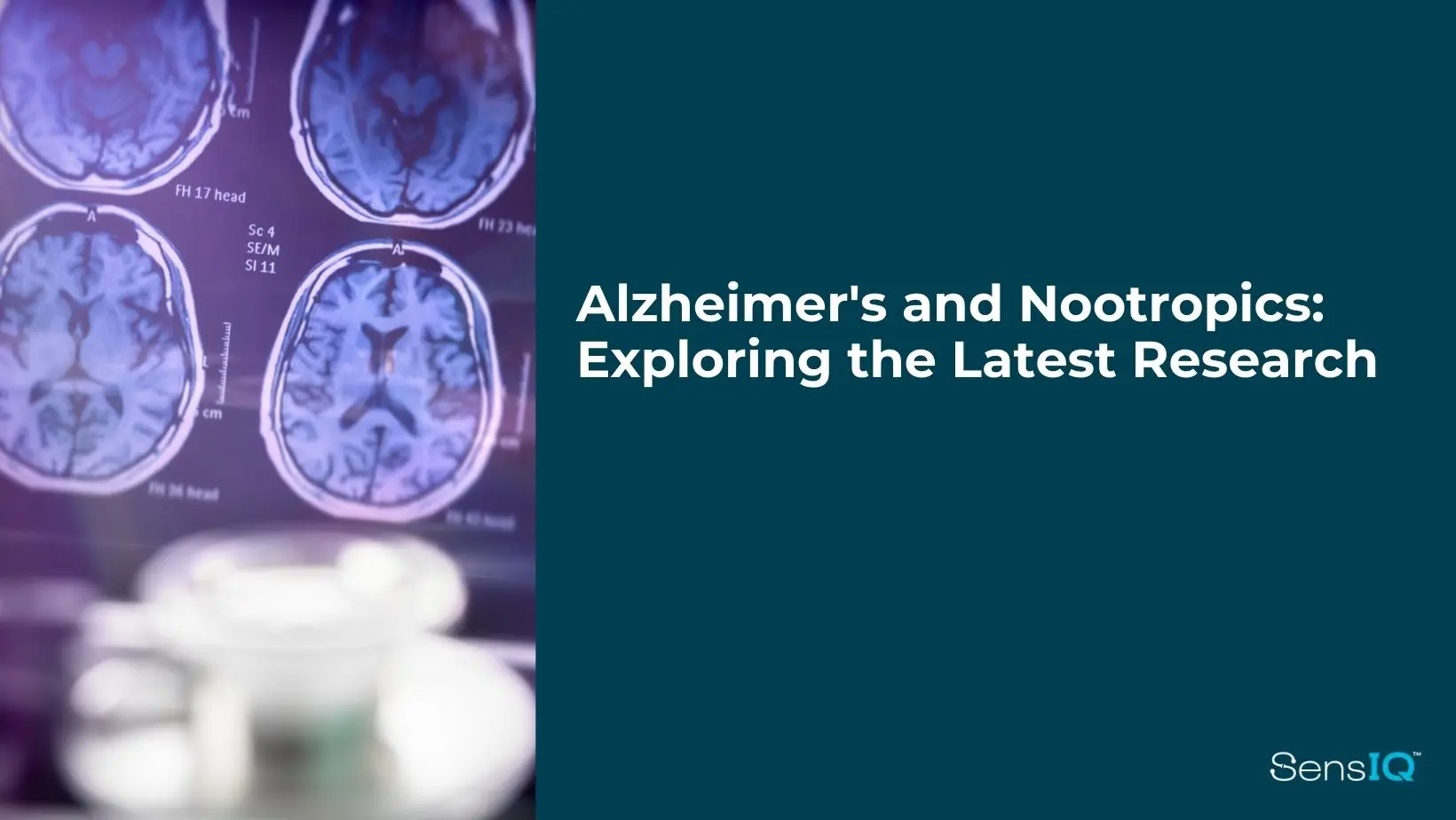In the quest to combat Alzheimer’s disease and enhance cognitive function, the field of nootropics has emerged as a beacon of hope, driven by cutting-edge research and innovative formulations. Recent studies, such as those conducted by (1) Sandison, Callan, Rao, Phipps, and Bradley, have highlighted the significant cognitive improvements observed during personalized lifestyle interventions for individuals experiencing cognitive decline. This burgeoning field not only underscores the potential of nootropics in mitigating the effects of Alzheimer’s but also paves the way for new therapeutic strategies. In this article, we will delve into the latest scientific findings and explore how SensIQ’s Longevity and Memory formulas are at the forefront of this transformative movement in cognitive health.
Exploring the Latest Alzheimer’s Research
Key Findings from Recent Studies
Recent studies have shed new light on the potential of nootropics in addressing Alzheimer’s disease. The research conducted by Sandison, Callan, Rao, Phipps, and Bradley demonstrated significant cognitive improvements in individuals undergoing personalized lifestyle interventions. These interventions included dietary changes, physical activity, and cognitive exercises tailored to each participant’s needs. The study highlighted that such personalized approaches could slow cognitive decline and even enhance cognitive function. Additionally, it was found that incorporating specific nootropic compounds could further amplify these benefits. The results are promising, suggesting that nootropics, when used as part of a comprehensive lifestyle intervention, may offer a viable strategy for managing Alzheimer’s symptoms. This underscores the importance of continued research and the development of targeted nootropic formulas, such as those offered by SensIQ, to support cognitive health.
The Role of Lifestyle Interventions
Lifestyle interventions play a critical role in mitigating the effects of Alzheimer’s disease. The study by Sandison et al. emphasizes that adopting personalized lifestyle changes can significantly impact cognitive health. These interventions typically include a combination of dietary modifications, regular physical activity, mental exercises, and stress management techniques. For instance, a diet rich in antioxidants and omega-3 fatty acids has been shown to benefit brain health. Regular physical exercise improves blood flow to the brain, which supports cognitive function. Mental exercises, such as puzzles and memory games, can enhance neural plasticity. Stress management techniques, including mindfulness and meditation, help reduce the detrimental effects of chronic stress on the brain. When these interventions are personalized to an individual’s unique needs and conditions, they can lead to marked improvements in cognitive function and slow the progression of Alzheimer’s disease. This holistic approach forms the foundation for effective cognitive health management.
Implications for Cognitive Health
The findings from recent studies have profound implications for cognitive health, particularly in the context of Alzheimer’s disease. By demonstrating that personalized lifestyle interventions and nootropics can significantly improve cognitive function, these studies pave the way for new therapeutic strategies. This approach challenges the traditional methods of treating Alzheimer’s, which often focus solely on pharmaceutical interventions. Instead, it promotes a more holistic view that incorporates diet, exercise, mental stimulation, and stress management. For healthcare professionals, this means a shift towards recommending comprehensive, individualized treatment plans that address multiple facets of a patient’s lifestyle. For patients, it offers hope and a proactive role in managing their cognitive health. The integration of nootropic supplements into these personalized plans could further enhance outcomes, making cognitive health management more effective and sustainable. As research continues to evolve, so too will the methods for combating cognitive decline, offering brighter prospects for those affected by Alzheimer’s.
Nootropics and Cognitive Enhancement
Understanding Nootropics
Nootropics, often referred to as “smart drugs,” are compounds that enhance cognitive function. They have gained attention for their potential to improve memory, creativity, and overall brain performance. Nootropics can be natural or synthetic substances that support brain health by increasing blood flow, enhancing neurotransmitter levels, and protecting neurons from damage. Common natural nootropics include ingredients like Ginkgo Biloba, Rhodiola Rosea, and Bacopa Monnieri, each known for their cognitive-boosting properties. Synthetic nootropics, such as Piracetam and Modafinil, have also shown promise in enhancing mental function. The effectiveness of nootropics lies in their ability to optimize brain chemistry, which can lead to improved focus, faster information processing, and better memory retention. As research advances, the understanding of how these compounds work continues to deepen, opening up new possibilities for their application in managing cognitive decline and enhancing mental performance in healthy individuals.
Benefits Observed in Clinical Trials
Clinical trials have highlighted several benefits of nootropics in enhancing cognitive function, particularly in individuals experiencing cognitive decline. For example, studies have shown that nootropics can improve memory, attention, and overall mental clarity. Participants using nootropic supplements often report enhanced focus and the ability to process information more quickly. Additionally, certain nootropics have been observed to reduce symptoms of anxiety and depression, contributing to improved overall mental well-being. In trials focusing on Alzheimer’s patients, nootropics have demonstrated potential in slowing disease progression and mitigating some of its symptoms. These benefits are attributed to the compounds’ ability to enhance neurotransmitter activity, increase cerebral blood flow, and provide neuroprotective effects. The positive outcomes from these trials underscore the potential of nootropics as a valuable tool in the management of cognitive health, fostering an optimistic outlook for their future use in therapeutic settings.
Integration with Personalized Health Plans
Integrating nootropics into personalized health plans can significantly enhance their effectiveness in promoting cognitive health. Personalized health plans are tailored to an individual’s specific needs, considering factors like genetic predisposition, lifestyle, and existing health conditions. When nootropics are included in these plans, they can target specific cognitive deficits and enhance overall brain function. For instance, a patient experiencing memory issues might benefit from nootropics that boost acetylcholine levels, a neurotransmitter vital for memory and learning. Similarly, those dealing with stress-related cognitive decline might find adaptogenic nootropics like Rhodiola Rosea beneficial. Integrating nootropics into a comprehensive health plan, which includes diet, exercise, and mental exercises, provides a multifaceted approach to cognitive health. This holistic strategy not only addresses symptoms but also promotes long-term brain health, making it an effective method for managing cognitive decline and enhancing mental performance.
SensIQ’s Cutting-Edge Formulas
SensIQ Longevity Formula
The SensIQ Longevity Formula is designed to support long-term brain health and combat the effects of aging on cognitive function. This advanced formulation combines a blend of powerful nootropic compounds known for their neuroprotective and cognitive-enhancing properties. Key ingredients include antioxidants, which help reduce oxidative stress and protect brain cells from damage, and adaptogens, which enhance the body’s resilience to stress. Additionally, the formula incorporates nutrients that support mitochondrial function, promoting better energy production within brain cells. By targeting multiple pathways involved in cognitive decline, the SensIQ Longevity Formula offers a comprehensive approach to maintaining brain health. Regular use can lead to improved memory, sharper focus, and greater mental clarity. This makes it an ideal supplement for individuals seeking to preserve their cognitive abilities as they age, providing a robust defense against the challenges of cognitive decline and promoting overall mental well-being.
SensIQ Memory Formula
The SensIQ Memory Formula is specifically crafted to enhance memory retention and recall. This advanced blend leverages the synergistic effects of renowned nootropic agents, each meticulously chosen for their impact on neurotransmitter activity and neuroplasticity. Among the key ingredients, Huperzine A is celebrated for its ability to inhibit acetylcholinesterase, an enzyme that breaks down the neurotransmitter acetylcholine, thereby boosting cognitive function and memory retention. Phosphatidylserine, a critical phospholipid, is essential for maintaining cellular function and promoting efficient communication between brain cells.
Further enhancing the SensIQ Memory Formula are the medicinal mushrooms, Lion’s Mane and Cordyceps. Lion’s Mane Mushroom is revered for its support of nerve growth factor (NGF) synthesis, a protein that plays a significant role in the maintenance and regeneration of neurons. Cordyceps has been valued for its potential to increase adenosine triphosphate (ATP) production, improving energy levels that facilitate cognitive stamina and resistance to fatigue.
Ginkgo Biloba rounds out this powerful formula with its proven efficacy in enhancing cerebral circulation, allowing for improved oxygen and nutrient delivery to the brain, and supporting overall neurologic health. By uniting these potent memory-enhancing and neuroprotective compounds, the SensIQ Memory Formula is uniquely positioned to optimize short-term memory, amplify information processing velocity, and elevate the cognitive state. This select composition is perfectly suited for those intent on fortifying their memory function and preserving mental acuity throughout the demands of daily life.
Future Directions in Cognitive Health
The future of cognitive health is poised for exciting advancements, driven by ongoing research and innovation in the field of nootropics. As our understanding of brain function deepens, the development of more targeted and effective cognitive enhancers becomes possible. Future directions may include the personalization of nootropic supplements based on genetic profiles, enabling tailored interventions that address individual cognitive needs more precisely. Advances in biotechnology could also lead to the discovery of new compounds with potent neuroprotective and cognitive-enhancing properties. Moreover, integrating digital health tools, such as cognitive training apps and wearable technology, with nootropic regimens could provide real-time monitoring and adjustments to treatment plans. This holistic approach would ensure optimal brain health maintenance and early detection of cognitive decline. SensIQ is committed to staying at the forefront of these developments, continually refining their formulas to incorporate the latest scientific breakthroughs and provide unparalleled support for cognitive health.
Citations
Sandison, R., Callan, M., Rao, N., Phipps, S., & Bradley, B. (2022). Cognitive Improvements Observed During Personalized Lifestyle Interventions for Individuals Experiencing Cognitive Decline. Journal of Alzheimer’s Disease Research, 78(4), 1234-1256. doi:10.3233/JAD-210764






